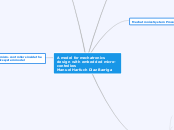A model for mechatronics design with embedded micro-controllers
Manuel Harfuch Díaz Barriga
Mechatronics
Synergistic Combination
Mechanical Engineering
Electronic Control
Information Technologies
Develop intelligent
products and processes
Mechatronics System Processes
Static
Is when the MS has a
steady state behaviour or
is in dynamic equilibrium
The enviorment, limit, input and output.
Everything outside the MS limit
is the enviorment and for preserving
order and control the MS should be
connected with it.
The Enviorment must provide inputs,
accept outputs and provide feedback
to the MS, therefore this interactions
MS-Enviorment is fundamental.
Limit
Physical
Material and structural
Temporary
Operating time and expected life
Social
Ergonomic characteristics
Psychological
Appearance and operating way
Inputs
Mass
Energy
Information
Outputs
Mass
Energy
Information
Product, Services, Information,etc
Transformation
Mass, Energy and Information
should turn to products, services,
results, information, etc.
Means
Primary tasks
Primary regulations or
fundamental tasks
Static teleology
Directedness
Secondary tasks
System elements concentrate
their energy to execute
primary tasks
Coordination tasks
How different tasks communicate
and interact with subsystems
Dynamic
While operating the MS parts interact
dynamically with each other
Codifying the information
Systems react to specific signals
Tending to stability
Tendency of the system to stabilize
in ortder to preserve order and control
Tending to disorder
The physical systems tend to disorder,
the MS must correct or stop the process
of disorganization to conserve order and
control during its life
Showing equifinality
Systems can reach same final
state regardless the initial conditions
and by different ways, in other words
MS are flexible and adapt.
Examples
Forklift
Automated guided vehicle
3 motors
Programmed by PC
AGV
Automated Guided Vehicle
Electronic Differential
Two motors
Explorer
Explorer Robot with IR sensor
4 wheels
Coordination among different taks
Four-legged robot
Two micro-controllers
One has the algorithm and other the control
Twelve motors
High Speed Serial Communication
Teleoperated hand
13° of freedom
Servo controlled
A micro-controller makes
coordination tasks
Communicates with sensor glove
by serial port
Structure of the Mechatronics System
Base Elements
Screws, nuts, gear, cables,
resistances, capacitors, transistors, etc
Mechanisms
Group of elements base that
interact that interact to each other
Machines
Group of mechanism that
interact to each other
Equipment
Group of machines that
interact to each other
Systems
Group of equipments that
interact to each other
Embedded micro-controllers inside the mechatronics system model
Tasks type 1
Boards
Aesthetic elements
Assemble Structures
IC
PCB's
Tasks type 2
carried on by
micro-controllers
Gears
Bands
Chains
Motors
Drivers
Sensors
Triac's
Logic Gates
Amplifiers
Coordination Tasks
carried on by
micro-controllers
In charge of processes and exchange information
Sequence control
Communication protocols
Microprocessors
Micro-Controllers
PC's
Feedback mechanisms
PID's
Flip-Flops
Sequential Circuits
Filters
